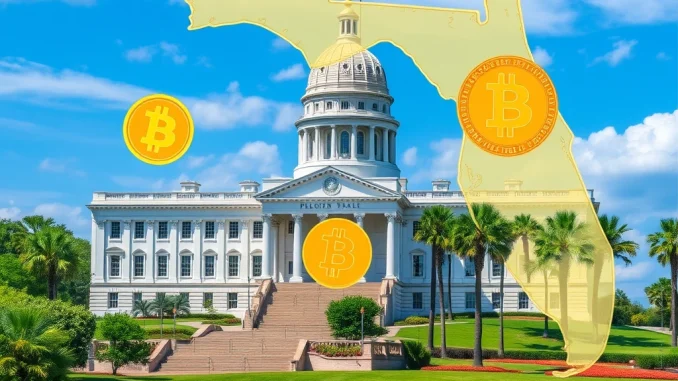
Cryptocurrency enthusiasts and policy watchers keeping an eye on state-level adoption initiatives recently received disappointing news from Florida. Efforts to establish a significant state Bitcoin reserve have stalled, marking a setback for proponents of government exposure to digital assets in the Sunshine State. This development highlights the ongoing challenges faced by crypto legislation as it navigates traditional political landscapes.
What Happened with the Florida Bitcoin Bill?
Two specific pieces of proposed crypto legislation, House Bill 487 (HB 487) and Senate Bill 550 (SB 550), aimed to pave the way for Florida to invest state funds directly into Bitcoin. The core idea was to allow up to 10% of certain state treasury funds to be allocated towards Bitcoin investment. This would have been a significant move, positioning Florida alongside a handful of other states exploring similar avenues.
However, according to reports, these bills did not make it through the legislative process before the crucial May 2 deadline. Missing this legislative window effectively means the proposals are dead for the current session. Lawmakers reportedly focused on other priorities during the session’s final days, pushing the Florida Bitcoin bill initiatives to the side.
Florida Joins List of States Where Government Crypto Investment Failed
The failure of Florida’s bills adds the state to a growing list where similar attempts at establishing a state Bitcoin reserve or facilitating broader government crypto investment have not succeeded. Florida is now the seventh U.S. state where such initiatives have been proposed but ultimately failed to pass. The other states include:
- Wyoming
- South Dakota
- North Dakota
- Pennsylvania
- Montana
- Oklahoma
This pattern suggests a broader trend across the U.S. While some states have adopted crypto-friendly regulations or explored blockchain technology, direct state treasury Bitcoin investment remains a difficult hurdle to clear. Skepticism regarding volatility, regulatory uncertainty, and competing legislative priorities often seem to outweigh the perceived benefits for many lawmakers.
What Does This Mean for Bitcoin Investment in Florida?
For now, the door to a state-backed Bitcoin investment fund in Florida appears closed. This doesn’t necessarily impact individual or corporate crypto activity within the state, but it does signal that official state endorsement and direct financial exposure to Bitcoin are not imminent. The failure of the Florida Bitcoin bill proposals means proponents will likely need to regroup and potentially reintroduce similar legislation in future sessions, perhaps addressing concerns that led to their initial stalling.
Conclusion: A Temporary Halt, Not Necessarily the End
The shelving of Florida’s state Bitcoin reserve bills is undoubtedly a setback for those hoping to see the state embrace digital assets at a treasury level. While the immediate future for government crypto investment in Florida looks uncertain, the underlying interest and the ongoing evolution of crypto legislation suggest that these discussions are far from over. The failure of this particular Florida Bitcoin bill serves as a reminder that integrating novel asset classes into traditional government finance faces significant political and logistical challenges.



